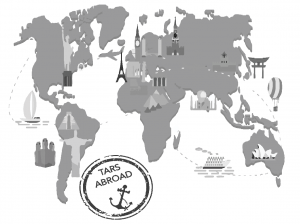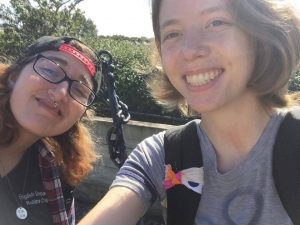After living and travelling in England for almost eight weeks, we compare and contrast our international experiences with our lives in America more and more. Since both of us have lived in the States our entire lives, coming to Britain has definitely been a change—even though it’s not as radically different as some other countries Rollins students study abroad in. (Shout out to our friends making it in Japan with the language barrier!) We enjoy discussing the differences between the country’s food, architecture, transportation, sports, politics, and just about everything else. It is strange because enough things are the same that we sometimes feel like we are living in a strange Twilight Zone version of what we are used to; things are similar yet slightly different in important ways. One of the strangest places we have noticed this feeling is in the faces of the people around us.
The longer we are here, the more we see people that look like friends, acquaintances, and even professors from Rollins. This has lead us to one important conclusion: doppelgangers are everywhere. It seems like each time we step outside we are doing a double take, wondering deep down inside if the girl that just walked by was another Rollins student secretly studying abroad and if she lived down the hall from Sianna last year.
Are we totally crazy? Maybe. Maybe not. According to a recent article by the BBC, “You are surprisingly likely to have a living doppelganger,” the chances of having the exact same face as someone are nearly impossible, but the chances of a creepy and uncanny resemblance are actually quite reasonable. Francois Brunelle has even photographed over 200 of these so-called doppelgangers—with many of them looking like identical twins or extremely similar siblings.
We’re constantly running into quite a few of our friends’ doppelgangers in our travels. One particular redhead keeps popping up across the United Kingdom, with sightings in Manchester, Edinburgh, London, Canterbury, and London again. A couple other friends have been repeatedly sighted together, first showing up in Edinburgh with a second sighting in our very own Lancaster city bus station. We have even spotted one specific professor at least once a day, no matter where we are. Though seeing the likenesses of our friends from the corners of our eyes can make us miss them even more, we love watching their doppelgangers do all sorts of things totally out of character for their double. For example, it’s quite a shock to see someone who looks exactly like the timid girl from that one English class Freshman year happily handing out “pole exercise” flyers in the Great Hall.
So, are we just subconsciously searching for familiar faces on this extremely unfamiliar campus? Well, probably. Rollins College has an undergraduate population of about 2,500, plus about 500 graduate students. Lancaster University has over 12,000 students, which is more than four times the size of what we are used to. At Rollins, you can recognize several faces in the ten minutes it takes to walk across campus, but at Lancaster, sometimes it seems like there are more people walking to get lunch than there are students currently enrolled at Rollins. Maybe our brains are just trying to cope with this insane amount of people, or maybe some people in Britain just really do look like our friends back home. Either way, it’s mildly creepy and oddly comforting.
So far, not everyone has a doppelganger on our campus, leaving some of our friends at home feeling left out of our new British lives. We promise we still love you, with or without the Lancastrian aesthetic behind us. Though it’s fun to see people that look like our friends and trying to take photos of them without looking creepy to share with their doubles, we are looking forward to seeing all our lovely friends again after our time in Britain is over. For now, though, we will stick to Facetime and try to remember to turn off our flash before snapping pictures of all those doppelgangers.
http://www.bbc.com/future/story/20160712-you-are-surprisingly-likely-to-have-a-living-doppelganger














Be First to Comment